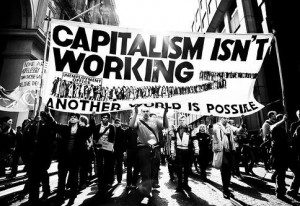Guest Writer for Wake Up World
Capitalism doesn’t want to solve the world’s challenges, it wants to make a business out of them.
But the real challenge is that not enough of the majority are “being the change in business” that we want to see in the world… probably because making ethical choices involves making sacrifices and actually doing something.
Would you give up using your smart phone because it might contain ‘Blood Minerals’?
Unfortunately we’re all hoping some bright spark is going to come up with an answer that allows everything to stay the same, while the moral dilemmas and environmental challenges neatly disappear.
[pro_ad_display_adzone id=”110028″]
It ain’t going to happen. It’s time for those who’ve lost faith in capitalism to rewrite the business software.
Why should you get involved?
Why? Because lessons are repeated until they’re learned. Moreover, each lesson is more costly and swifter to return. Financial upswings will become ever shorter, the downturns even longer. If it didn’t get you this time, it’s just a matter of time.
Anyone who believes in indefinite growth on a physically finite planet is either mad, or an economist. ~ D. Attenborough
This version of Capitalism hasn’t work for a few decades for the majority; wages in real terms have stagnated at best or gone into decline. Capitalism has improved the lot of a few developing countries, but they will reach threshold points too, arriving there sooner than we did.
We need an evolutionary next step. But what will it look like, how will it work and – more to the point – what will we call it?
The reality is that we need another name for a new economic system, but it could just as well be you who comes up with the name. There are no heroes out there – we’re all the heroes we’re waiting for, so get your thinking caps on. (Feel free to leave your ideas below!)
To help you come up with a name for this alternative style of economy, here are some traits and comparisons to help you.
These are some of the hard choices and differentiators we face if we want the world to become a more socially just, environmentally sustaining and personally fulfilling place to live.
Quality vs. Quantity
Do you need to keep replacing your cheap import TV or laptop with its built in obsolescence or would you be willing to do without until they created a home grown version built to last and easily upgraded with new parts as opposed to having to throw away the whole TV just to get the latest version?
Ethical vs. Exploited
At the moment a lot of developing countries are coerced into producing cheap goods or services. Would you refuse to buy anything which is not ethically produced or continue to buy products which often force under-age labourers to work for a pittance?
If you’re going to change the world, it’s going to be very uncomfortable. ~ Peter Joseph
Ecocentric vs. Egocentric
The idea that we should grow perpetually is actually an egoic need. The ego doesn’t like to let go of what it has gained or to stop gaining at the same rate.
As consumers and supplier of goods and services within society, we would have to be willing to forgo some of our own emotional needs and ponder on the ecological impact of our purchase decisions and the way we conduct business.
Informed vs. Influenced
Corporations are experts at managing your perceptions and siphoning money upwards and out of the communities they prey on. Most of the big food corporates don’t support GMO labelling, so I guess that’s a good reason why we should. We need an educated population immune to propaganda and marketing.
Circular vs. Linear
The next economy would insist products mirror the production cycle of nature in that something comes into existence and is able to be reabsorbed back into a closed loop, circular system. The alternative is to turn the planet into a giant landfill site.
Open Source vs. Oppression
The new economic system could allow developing countries to bypass stages of technological evolution. For example, many in Africa have a mobile phone but bypassed the use of landline telephone technology. India and Africa, due to its lack of infrastructure, could actually produce a lot of clean energy, if we shared the technology.
A no-growth economy is a curious creature to think about, but as Sherlock Holmes once put it: once you have eliminated the impossible, whatever remains, however improbable, must be the truth. ~ J. Rowson
Transparent vs. Taking Liberties
We tend to base our decisions of economic viability, without taking into account the “hidden externalities.” It isn’t as cheap or as healthy as it’s perceived to shop in large retail stores compared to buying local produce. Add the packaging which you pay to dispose of, the environmental costs and the time and fuel it takes to drive to a central retail outlet—it soon mounts up.
Balanced vs. Extreme
We can see the damage that too much power or a one-sided political or economic ideology or philosophy has on the environment and society. Nature provides her own strategies for remedying such situations and bringing the world back into balance.
Although nobody in authority is admitting that there could be a viable alternative to capitalism, you can bet the answer involves being adaptable, balanced between ecology, environment, knowledge and behaviours.
Cooperatives vs. Corporations
What we do not need are multi-national giants who by their very nature are out of touch with the natural world and the world of ordinary people. Cooperatives are currently outperforming regular businesses in so many ways.
Economics is so disconnected from the real world, it is destructive. ~ David Suzuki
Purpose Focused vs. Activity Driven
We have all the technological savvy to solve so many of the challenges we face. What we don’t have is the right politico/economic systems or the motivation to make it happen.
In the natural environment dog poop breaks down naturally in a few days. We weren’t happy with that so now we’ve made an even worse problem. Now there’s dog poop filled plastic bags lying on the beaches and in the dunes (where I live) discarded by dog owners.
That’s capitalism for you. Instead of coming up with a fundamental solution, we create a business out of it, ensuring the perpetuity of the problem. That’s why very little is changing.
Innovation vs. Consolidation
All businesses reach a limit to growth so then they consolidate. That’s basically getting fatter and bigger doing the same thing while usually becoming less ecological.
Car companies killed off the electric car because it meant making less profit on selling spare parts.
Apple isn’t really innovating; they’re doing the same as Gillette did with their razors – adding another blade to the razors to make them more expensive and re-launching it as a new innovation. Real innovation would be to manufacture the iPhone locally and sustainably.
Questioning growth is deemed to be the act of lunatics, idealists and revolutionaries. But question it we must. ~ Tim Jackson
Stability vs. Growth
In order for capitalism to work we have to have instability, probably why there are so many wars. There has to be oppressors and the oppressed because that’s the only way we can pursue the perpetual economic growth fetish. One group has to exploit another otherwise you cannot extract a profit from any deals you make.
Collaboration vs. Competition
What’s the point of having ten different television makers all producing different versions of the same thing, competing for the same customers?
We will have to consider the supplier and the client a symbiotic relationship which will involve a level of collaboration rarely seen before. After all, they’re both reliant on each other for survival.
Diversity vs. Monolithic
Without this version of capitalism in place, there would be a healthy diversity of micro-niche, ecological friendly products and services. As it is, we have to discard so much of human potential to fit into a monolithic system.
The money lender was regarded as a predator on other peoples’ misfortunes; the capitalist lender who lives off the fruits of his money, rather than personal efforts. ~ William N. Goetzmann
Freedom vs. Debt Slavery
Throughout history ancient civilizations have passed loan forgiveness edicts.
Socrates himself described money-lenders as parasites. Although extending credit was originally a form of neighbourly reciprocity in rural societies, it evolved into something quite different. The technology of finance contradicts the natural compassion that mankind is capable of.
Banks and corporations don’t forgive and are still trying to make broke people and countries pay back what they haven’t got. Of course it’s different when they need the forgiveness.
“You never change things by fighting the existing reality. To change something, build a new model that makes the existing model obsolete.” ~ Buckminster Fuller
Two-Tier vs. Hierarchical
The distribution of wealth resembles an hour glass. It’s great at the top, getting worse at the bottom, with more and more moving from the middle downwards and into poverty.
The new economy might actually have to evolve separately from the hierarchical system in place today. The politicians and corporate elites won’t let go of power and so an autonomous break away would probably be necessary for a time.
In Bristol, UK, they have even created their own “real” local currency which can only be used within the community.
When you say you’re “gonna throw something away”… where is away? There is no away. ~ Julia B. Hill
Climate vs. Capitalism
Enough said really. I mean who wants capitalism at the cost of the ability to live freely and comfortably on the planet?
Technological vs. Tedious
The drive to bring down prices means that there will be more technological unemployment which is a good thing because it’ll force people out of their comfort zones and make them creative.
A hundred years ago most people were entrepreneurs. The future for mankind is about micro businesses and small global businesses which display the wealth of ingenuity and diversity humankind is capable of and creating an ecologically sound and resilient economy.
Replicable vs. Scalable
When a business reaches a limit to growth instead of growing into a monolithic institution, they will share the lessons learnt with others elsewhere and allow them to replicate their success elsewhere, instead of trying to own it all.
Prosperity vs. Profits
Prosperity is more than just wealth, it includes such things as health, well-being, relationships, the natural environment, ecology, valued relationships. Now businesses will value these and not just focus on profit which kills off all the things that actually make us happy. The end values will not be confused with the means values.
Inspiration vs. Motivation
Motivation is the moving away from a source of pain or towards pleasure. Inspiration is an inner drive which is usually in pursuit of serving others or to be part of something bigger than ourselves. If we wait for the pain of capitalism to get so bad that politics makes corporate powers act, then you can be sure it will be too late. The Arab spring began over the price of bread. It’s either a case of waiting for painful change or be pre-emptive and create a brave new world.
It’s your choice.
Be the change in business.
Previous article by Martin:
About the author
Martin Murphy is an explorer of life and connector of dots. Martin works internationally as a speaker and coach on peak performance, confidence and behavioural transformation towards sustainability and purposeful living. His work and writing have been featured in media worldwide.
Martin designs and delivers innovative, leading edge development programs to leaders, groups and individuals, helping them to unleash their purpose, passion and potential upon the world with his ‘OPTIMISE Your Life…. Change the World’ program. He currently spends a lot of time walking on the beach, collecting driftwood and inspiration for his next book; ‘Be the Change in Business’.
To find out more, please visit theperformanceconsultant.com and bethechangeinbusiness.wordpress.com
[pro_ad_display_adzone id=”110027″]







